detail profile fujiko yamamoto
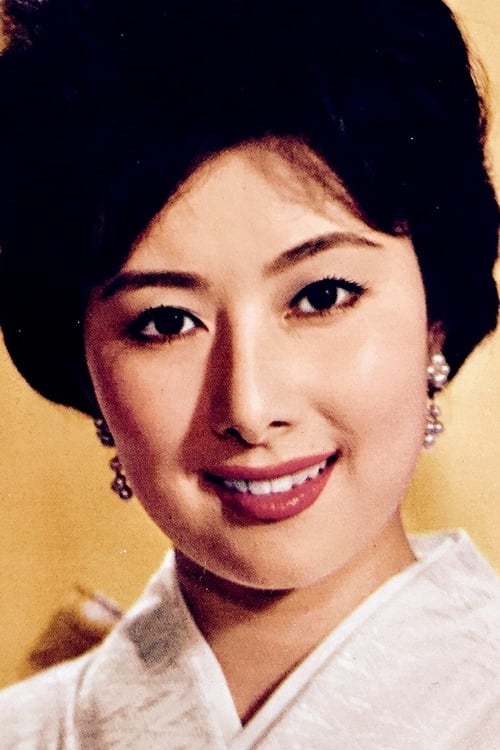
Fujiko Yamamoto
山本富士子
atau dikenal sebagai
Riwayat Hidup
Fujiko Yamamoto (山本富士子, Yamamoto Fujiko) (born 11 December 1931) is a Japanese stage, film and television actress.
She was the winner of the first Miss Nippon Grand Prix in 1950, and appeared in over 100 films between 1953 and 1963, including works by directors Yasujirō Ozu, Kon Ichikawa, Shirō Toyoda and Kōzaburō Yoshimura.
Yamamoto was born on 11 December 1931 in Nishi ward, Osaka.
In 1953, she made her film debut at Daiei Film, and became one of the studio's top actresses.
Yamamoto was considered one of Japan's most beautiful women, with, in the words of film historian Catherine Russell, "noble" features that represented the classic ideal of Japanese beauty.
As such, she was well-suited for costumed parts in the era's popular period dramas, with her less-frequent modern roles (in films like Ozu's Equinox Flower and Ichikawa's Being Two Isn't Easy) often shot in "movie star" closeups that placed her apart from the films' contemporary storytelling.
In 1963, when her contract came up for renewal, she insisted on changes.
The head of Daiei, Masaichi Nagata, refused, dismissed her, and prevented her from finding work at other film studios via the Five-Company Agreement.
After the Daiei dismissal, Yamamoto acted in the TV series Toshiba Sunday Theatre and on Fuji TV.
Even though she has appeared frequently on stage and on television, she has not appeared in a film since then.
Info Pribadi
Peran Yang Di Mainkan Fujiko Yamamoto
 Its Christmas Eve in Tokyo as...
Its Christmas Eve in Tokyo as...Ghost Soup 1992
It's Christmas Eve in Tokyo as Ichiro is moving into his new apartment one month ahead of schedule. As he is getting settled in, two strangers enter the apartment and are surprised to find him there. They begin complaining that he is upsetting their plans for a Christmas party to be thrown in the apartment that night before attempting to kick him out.
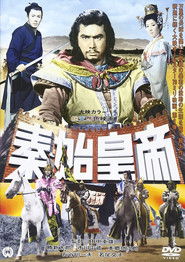 In 221 BC Qin Shihuangdi conquered the...
In 221 BC Qin Shihuangdi conquered the...The Great Wall 1962
In 221 BC, Qin Shihuangdi conquered the rest of China. Qin's great accomplishments and also his serious faults are showed in this film. Qin adopted autocratic dictatorship and led a luxurious life: abolition of feudalism and the centralization of power in the form of a now-hereditary bureaucracy loyal to himself; burning books and burying scholars; the construction of a sumptuous palace for his concubines and also the Great Wall.
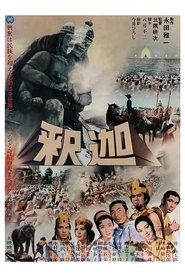 An Indian prince leaves his world...
An Indian prince leaves his world...Buddha 1961
An Indian prince leaves his world of comfort and riches behind to wander and meditate for six years in search of spiritual enlightenment. Siddartha (Cojoin Hong) turns his back on the old religion when people are starving needlessly and holy rituals include human sacrifices. During his meditations, he is tempted by erotic dancing women, demons, and the evil machinations of his criminal cousin. Devastate to attain the spiritual perfection and become the Buddha. He travels to convert followers by his kindness and wisdom, gaining a multitude of believers when he stops an elephant from crushing a local priest. Buddha of course goes on to become one of the great religious leaders of the world.
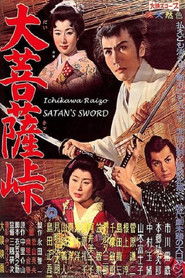 The Daibosatsu toge trilogy is based...
The Daibosatsu toge trilogy is based...Satan's Sword 1960
The Dai-bosatsu toge trilogy is based on Kaizan Nakazato's unfinished long series of novels (41 books, written from 1913 to 1941). Set in the last period of the Tokugawa Shogunate, Daibosatsu Toge tells the story of Ryunosuke Tsukue, a nihilistic swordmaster who doesn't hesitate to kill anyone, bad or good.
 In this Japanese drama a village...
In this Japanese drama a village...The Twilight Story 1960
In this Japanese drama, a village girl goes to Tokyo and becomes a hooker to support her ailing mother. While there she meets an unmarried teacher (at least he says he's unmarried) and falls in love. When she learns that he lied and is married to a woman whose child was fathered by another man, she is crushed. He returns to his wife. The woman becomes more distraught when she learns her uncle has misused the money she has sent. As the final straw, her mother dies, and the girl becomes sick.
 Wataru Hirayamas outwardly liberal views on...
Wataru Hirayamas outwardly liberal views on...Equinox Flower 1958
Wataru Hirayama's outwardly liberal views on marriage are severely tested when his daughter declares that she is in love with a musician and is adamant to live life her own way, instead of agreeing to an arranged marriage. Outwitted by his female relatives, Hirayama stubbornly refuses to admit defeat.
 From the pen of Yoshikawa Eiji...
From the pen of Yoshikawa Eiji...Secret of Naruto 1957
From the pen of Yoshikawa Eiji comes this exciting story. The Naruto Strait separates Tokushima from the islands of Awaji and Honshu. On Tokushima the mad lord dreams of conquest and forges a bloody revolt against the Tokugawa shogunate. A mysterious swordsman named Noriyuki Gennojo has crossed Naruto’s waters to uncover the Awa clan’s secrets. He puts his life on the line after finding a testament of Awa’s secrets, written in blood by a dying man. Joining Noriyuki are a female ninja who loves him, and the beautiful daughter of an enemy who’s sworn to kill him. Awa’s defenders willl stop at nothing to prevent the blood-soaked letter from reaching the shogun.
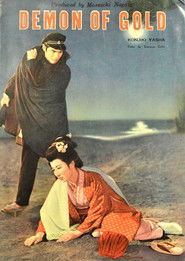 Tokyo 1890 Through avarice a series of...
Tokyo 1890 Through avarice a series of...The Golden Demon 1954
Tokyo, 1890. Through avarice, a series of misunderstandings, and failures of courage, the engagement of Kan-ichi (a student) and Miya (the daughter of Kan-ichi's debtor) is canceled to enable Miya to marry Tomiyama, a wealthy banker's son. In bitter despair, Kan-ichi breaks with his friends, drops his studies, and declares he has ceased to be human. He apprentices to a money-lender, and he's soon ruthless and wealthy. Several years later, Miya's in misery, her husband mistreats her. She goes to Kan-ichi to beg forgiveness; he pushes her away. He's now pursued by Akagashi, herself a cold-hearted loan shark. Can anything free Kan-ichi's hard heart from the golden demon
 Believing that the world will end...
Believing that the world will end... In Edo Japan a kabuki actor...
In Edo Japan a kabuki actor... The days leading up to a...
The days leading up to a... Kaze is a philandering TV producer...
Kaze is a philandering TV producer...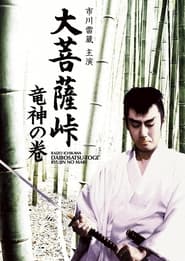 The sequel to Daibosatsu tge 1960 and...
The sequel to Daibosatsu tge 1960 and...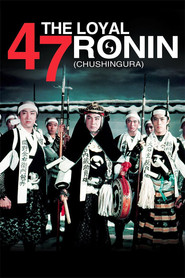 Japan 1701 A group of samurai become...
Japan 1701 A group of samurai become...
 A traditional bar mistress in Kyoto...
A traditional bar mistress in Kyoto... In Kyoto a young kimono maker...
In Kyoto a young kimono maker...